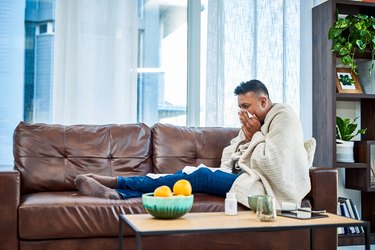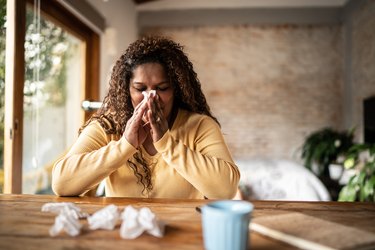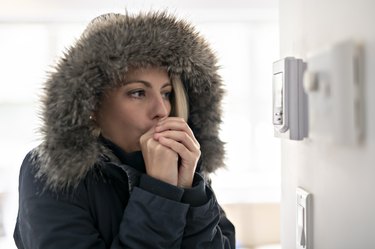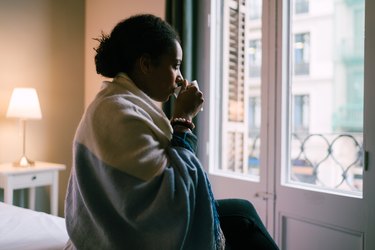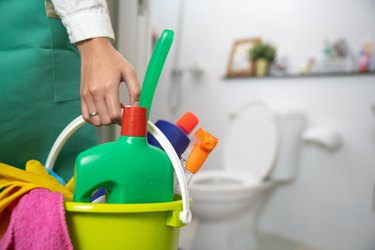
When people in your home are ill, it's hard to avoid their germs. That's true whether your kids, roommates or partner have seasonal sniffles, or a more serious illness, such as the flu or the novel coronavirus.
"When one family member becomes ill, other members of the family are likely to become ill due to their close proximity," pediatrician Eyla Boies, MD, clinical professor of pediatrics at UC San Diego Health and American Academy of Pediatrics-California Chapter 3 infectious disease committee chair, tells LIVESTRONG.com.
Video of the Day
Video of the Day
And of course, as bugs spread throughout your household, the task only becomes that much more challenging.
But there are strategies you can try — even in your home — to cut down on your chances of getting sick from roommates or family members. Here's what experts recommend.
1. Limit Contact With the Person Who's Sick
If at all possible, your best strategy is to isolate the family member who is ill, says George Abraham, MD, chair of the American Board of Internal Medicine's infectious disease board. That's particularly recommended for the flu and COVID-19, he says, since they both involve respiratory spread — that is, droplets with the viruses spread in the air when the infected person breathes, sneezes, coughs and so on.
If possible, set the person who is sick up in their own room. You'll also want to avoid contact with any item that the sick person touches.
"Family members should take extra care in avoiding sharing towels, washcloths or drinking out of the same glass, cup or straw," Dr. Boies says.
If someone in your household has COVID-19, wear a mask and disposable gloves before handling their laundry, per the Centers for Disease Control and Prevention (CDC). Trash the gloves when you're done, then clean your hands. You'll also want to clean the laundry basket that held dirty laundry, according to the CDC.
Wash their dishes with gloves on, too.
Can You Get Sick From Sleeping in the Same Bed?
If your significant other is sick, keep apart during nighttime hours, too.
“Sleeping in separate rooms, if possible, will help reduce transmission of infections,” Dr. Boies says.
Plus, even though sleeping on the couch isn’t the most comfortable option, it’s likely better than trying to sleep through sniffle-induced snoring or middle-of-the-night coughing fits.
2. Encourage Good Bathroom Hygiene
"If you have a place with two bathrooms, it's a good idea to designate one for the sick person," Joseph Allen, MPH, D.Sc, director of the Healthy Buildings program at Harvard and an assistant professor of Exposure Assessment Science at the T.H. Chan School of Public Health, tells LIVESTRONG.com.
If you don't have multiple bathrooms, he recommends following these best practices:
- Ventilate: Run the exhaust fan — both while the person with the infection is using the facilities and after they leave. (More on the perks of ventilation later.) "If you don't have an exhaust fan, leaving the window open just a couple of inches will really help," Allen says.
- Close the lid: People who are under the weather should close the lid to the toilet before flushing. Flushing the toilet can aerosolize the fecal matter throughout the room, Allen says. And, COVID-19 is found in feces, per an April 2021 systemic review in Clinical and Translational Gastroenterology. That makes for a potentially infectious (not to mention gross) situation, although note "a case of direct feces-oral transmission is yet to be reported," per the systemic review. Contact with feces can lead to catching colds, per the CDC.
- Wash your hands: Washing your hands after using the restroom should be part of everyone's routine anyway. But it's especially important for people under the weather to suds up after they go — after all, they'll be touching the bathroom doorknob next!
Avoid going in the restroom right after someone who's ill has used it, Allen advises. You want to give the bioaerosols (tiny virus-containing particles) time to dissipate, he says. And wear a mask when you use the bathroom if it's a shared space, per the CDC.
These are simple, easy steps to take, Allen notes. "It's not asking a lot to say, 'Please flush the toilet, leave the exhaust fan on and wash your hands.'"
3. Wash Your Hands
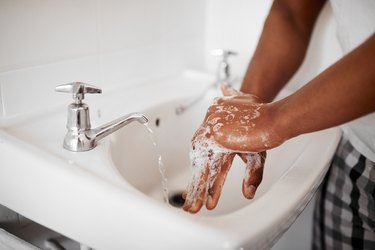
By now, you're a pro at washing your hands: You know to do it every time you enter your home from outside, and to suds up for a full 20 seconds.
Keep up this habit, but add to the frequency: You'll want to wash your hands anytime you come in contact with the sick person in your home — or anything they've had their hands on, from the TV remote to a mug of tea.
And of course, you'll want to avoid touching your eyes, nose or mouth since if you do so with germs on your hand, you can catch the virus.
Tip
What if you're a parent caring for a sick child, or you're ill and want to keep your children healthy? Follow the CDC's guidelines for caregivers.
4. Wear a Mask
If you're home with someone who is under the weather, you should wear a face mask when you come into contact.
"If the person who is ill wears the mask, and others in the home wear the mask, we protect each other from the spread of respiratory droplets with virus," Dr. Abraham says.
People with COVID-19 should absolutely wear a face mask when they're near others at home, and caretakers should put on a mask before going in the same room as someone with COVID-19, per the CDC.
5. Clean Surfaces Frequently
Germs can spread easily on surfaces.
Here's how that plays out: A sick person blows their nose, then, without thinking, opens the kitchen trash can to deposit a tissue. A few minutes later, you wander by and touch that same, potentially germ-covered, trash can lid. Plus, when sick people sneeze or cough, droplets containing the cold virus (or any other virus) can land on the surface, per the U.S. National Library of Medicine (NLM).
"The [COVID-19] virus does linger on surfaces at least for a few hours," Dr. Abraham says. And that's the case for cold and flu viruses, too, per the Mayo Clinic.
"It is difficult to always wash one's hands before touching a surface before another family member comes along and touches the same surface," Dr. Boies says.
Clean high-touch surfaces — doorknobs, bannisters, the mailbox lid, light switches, the refrigerator door and so on — first using soap and water, and then using a disinfectant, per the CDC. Use disposable gloves during this process, according to the CDC. By cleaning, you'll physically remove germs, while disinfecting kills any germs that remain.
Tip
Check if your disinfectant will work to eradicate SARS-CoV-2, the virus that causes COVID-19, using this search tool from the Environmental Protection Agency (EPA).
6. Ventilate the Space
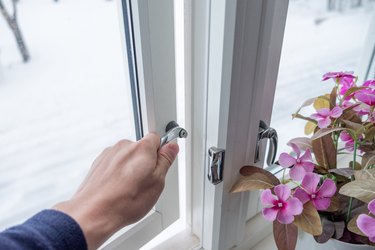
When a person who's ill sneezes, coughs or even exhales, germ-filled droplets fill the air. So just as you put in time to remove germs from surfaces, you'll also want to put in some effort to eradicate them from the air.
"If you think about airborne viruses, they'll build up over time in a room unless you remove them in one of two ways: you move them out through ventilation or you clean them out of the air through filtration," Allen says.
The first strategy is the simplest: If you can, open up a window to increase the circulation, per the CDC. But sometimes that's not possible. Maybe you're in a high-rise building with windows that don't open, or the temperatures are simply too low to let in the frigid outside air.
In that case, you can opt to clean the air using an air cleaner or air purifier with a HEPA filter. Run the device in the room where the sick person is spending their time, Allen says.
What to Look for in an Air Cleaner
No need to seek out a device with lots of bells and whistles. “This is off the shelf, local hardware store portable air cleaner with a HEPA filter — you don’t need anything extra like ionization,” Allen says.
Here’s what to keep in mind when you purchase an air cleaner/air purifier:
- A HEPA Filter: Only buy air purifiers with a HEPA filter. This filter allows the device to trap the tiny particles that the virus has attached itself to, per the Mayo Clinic, so it will no longer circulate around in the room.
- Choose the right size for your space: To do so, look at the CADR or clean air delivery rate, which needs to be large enough for the space, per the EPA. For a 300-square-foot room, for example, you’ll want a CADR of 195.
7. Use a Humidifier
If you have a humidifier, it can be helpful to run it if someone in your household is sick. For one thing, your body's respiratory defenses function better when it's less dry, Allen says. Dry air means that your nasal passages can get dry, making them more susceptible to viruses, per Johns Hopkins Medicine.
Plus, by running the humidifier, you'll increase the humidity in your home. That's a good thing, since most viruses survive best at lower humidity, Allen says.
"When it's more humid, respiratory droplets don't evaporate as fast. And that means they stay heavier, and will settle out of the air," Allen says.
When researchers simulated an exam room to try to understand if humidity contributes to the risk of aerosol transmission of the flu, they found that at low humidity levels, the flu "retains maximal infectivity," according to a February 2013 study in PLOS One. The researchers note that keeping indoor humidity above 40 percent will reduce the infectiousness of the aerosolized flu virus.
8. Get Your Flu Shot
Ideally, you'll get vaccinated early in flu season, which typically begins in mid-October in the U.S. That's because it takes two weeks for the vaccine to be effective at fighting off the flu, per the CDC.
Getting the flu shot is the very best strategy to avoid getting the flu, according to the CDC. But if someone in your home has the flu, and you haven't yet gotten your shot, go ahead and head to the pharmacy or doctor's office and get the vaccine.
"We would recommend both the person who got ill and the family members get the flu vaccine to prevent against all the strains of the flu," Dr. Abraham says.
9. Get Enough Sleep
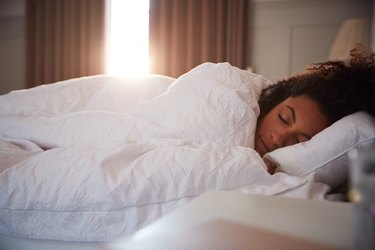
You'll want to keep yourself healthy to avoid getting sick. Start by getting enough sleep.
"Poor sleep is associated with immune suppression, so the ability to fight infection goes down," Dr. Abraham says.
Have trouble nodding off? Follow these five steps to help you catch better zzzs.
You'll also want to eat a healthy diet and get a moderate amount of exercise, Dr. Abraham says. "Staying well rested and hydrated may not prevent transmission of a viral upper respiratory infection but may allow one to recover more quickly and not be as ill as those who are not generally as well rested," Dr. Boies says.
Should You Take Vitamins and Supplements, Too?
When someone in your home is sick, you might have the impulse to swallow fistfuls of vitamins, take zinc or guzzle giant glasses of orange juice to load up on vitamin C.
“In moderate amounts, [vitamins and supplements] can’t harm, but I can’t say that there is overwhelming scientific evidence to support its use. So those are personal preferences,” Dr. Abraham says.
An exception might be vitamin D.
“Persons with low levels of vitamin D may be more susceptible to infections,” Dr. Boies notes. Taking vitamin D as a supplement protects against respiratory tract infections, particularly for people who are deficient in the sunshine vitamin, per a February 2017 meta-analysis published in BMJ.
The Bottom Line
If you want to avoid catching an illness from someone who's sick in your household, the tactics are simple, and likely familiar, echoing back to your parents' reminders when you were growing up. We're just not always the best at practicing these habits, Dr. Abraham says.
But following these good hygiene protocols can really make a difference.
"They're boring, but they work," Allen says. "Hand-washing isn't exciting, but it works. Opening the windows isn't exciting, but it helps. These are tried-and-true interventions."
- CDC: "Common Colds: Protect Yourself and Others"
- U.S. National Library of Medicine: "Common colds: Overview"
- Mayo Clinic: "How long do cold and flu viruses stay alive after infected people cough or sneeze?"
- Environmental Protection Agency: "List N Tool: COVID-19 Disinfectants"
- Mayo Clinic: "Can a home air purifier system protect you against COVID-19?"
- EPA: "Guide to Air Cleaners in the Home"
- Johns Hopkins Medicine: "Common Cold"
- PLOS One: "High Humidity Leads to Loss of Infectious Influenza Virus from Simulated Coughs"
- CDC: "Key Facts About Seasonal Flu Vaccine"
- CDC: "Healthy Habits to Help Prevent Flu"
- BMJ: "Vitamin D supplementation to prevent acute respiratory tract infections: systematic review and meta-analysis of individual participant data"
- CDC: "Sick Parents and Caregivers"
- Clinical and Translational Gastroenterology: "Prevalence and Persistent Shedding of Fecal SARS-CoV-2 RNA in Patients With COVID-19 Infection: A Systematic Review and Meta-analysis"
- Centers for Disease Control and Prevention: "Clean and Disinfect at Home"
- CDC: "Caring for Someone Sick at Home"
- CDC: "When and How to Clean and Disinfect Your Home"
- CDC: "Cleaning And Disinfecting Your Home "
Is this an emergency? If you are experiencing serious medical symptoms, please see the National Library of Medicine’s list of signs you need emergency medical attention or call 911.


